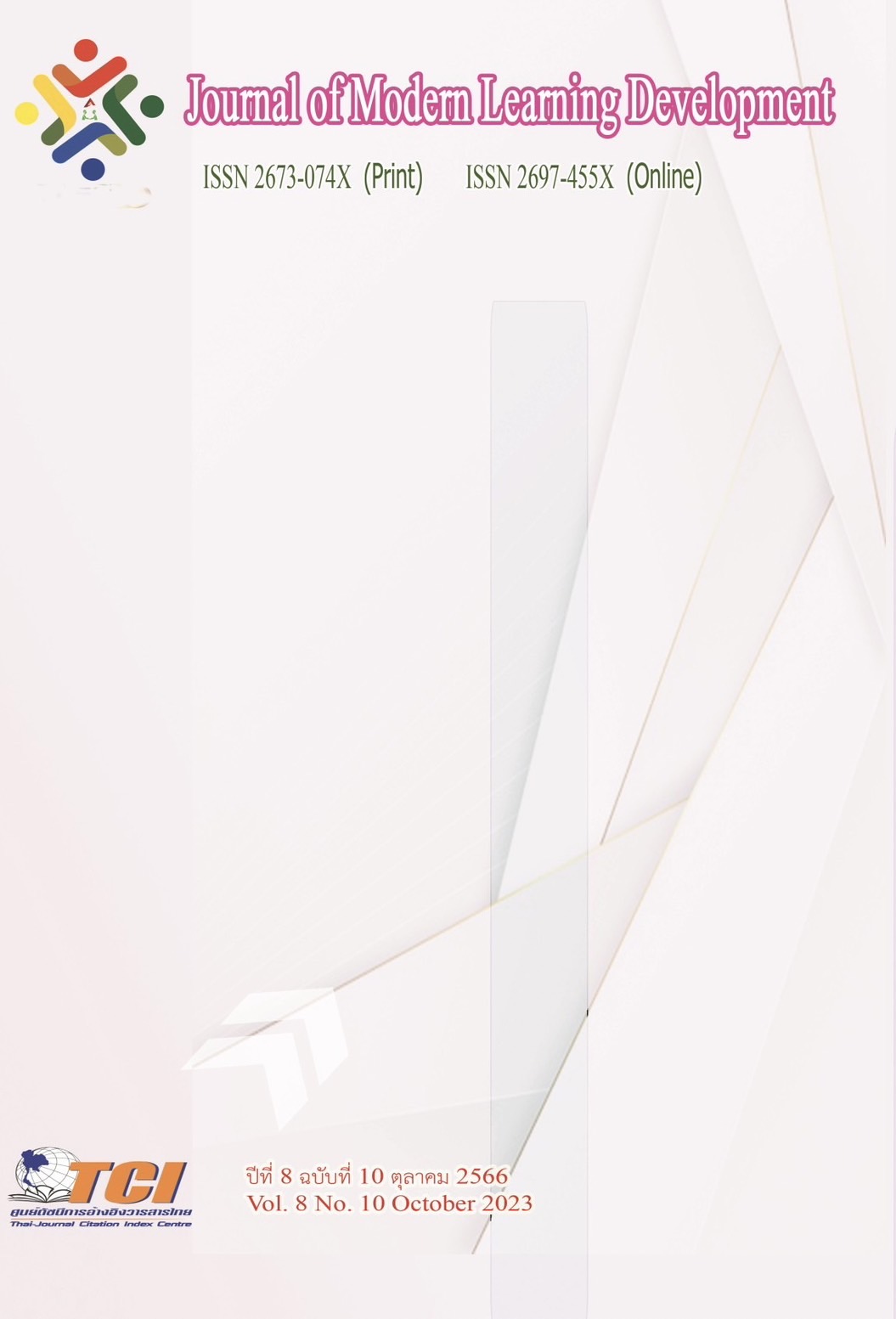The Development of Literature Achievement “Su Pha Sit Sorn Ying” by Using Constructive Controversy Method with Educational Games for Grade 6 Students
Main Article Content
Abstract
The purposes of this research were 1) to develop the Thai literature lesson plans
“Su Pha Sit Sorn Ying” by Constructive Controversy Method with Educational Games for grade 6 students 2) to compare the literature achievement of Thai literature “Su Pha Sit Sorn Ying” by using Constructive Controversy Method with Educational Games for grade 6 students between pre-learning and post-learning and 3) to study the satisfaction of learning by Constructive Controversy Method with Educational Games for grade 6 students. The sample, selected through the purposive sampling consisted of 8 grade 6 students in the second semester of the 2022 academic year studying at Baphae School. The instruments for this research were four Thai literature lesson plans “Su Pha Sit Sorn Ying”, the achievement pre and posttest of Thai literature “Su Pha Sit Sorn Ying”, and a satisfaction survey of grade 6 students towards learning by Constructive Controversy Method with Educational Games. The data were analyzed by Mean, Percentage, Standard Deviation (S.D.), and t-test dependent.
The results of this research showed that
1) The Thai literature lesson plans “Su Pha Sit Sorn Ying” were suitable in various element at the highest level ( = 4.43, S.D. = 0.46).
2) The literature achievement of Thai literature “Su Pha Sit Sorn Ying” by using Constructive Controversy Method with Educational Games for grade 6 students was higher than before learning at the significance level of .05.
3) The satisfaction of students towards learning by Constructive Controversy Method with Educational Games was high level ( = 4.43, S.D. = 0.4)
Article Details
References
กระทรวงศึกษาธิการ. (2551). ตัวชี้วัดและสาระการเรียนรู้แกนกลาง กลุ่มสาระการเรียนรู้ภาษาไทยตามหลักสูตรแกนกลางการศึกษาขั้นพื้นฐาน พุทธศักราช 2551. กรุงเทพมหานคร: โรงพิมพ์ชุมชนสหกรณ์การเกษตรแห่งประเทศไทย.
เนตรดาว ใจจันทร์. (2558). การพัฒนารูปแบบกิจกรรมการเรียนรู้ตามทฤษฎัการพิพาทเชิงสร้างสรรค์เพื่อสร้างเสริมความเป็นพลเมืองในประชาคมอาเซียน สำหรับนักเรียนมัธยมศึกษาตอนปลาย. วิทยานิพนธ์ กศ.ด., บัณฑิตวิทยาลัย: มหาวิทยาลัยนเรศวร.
เบญจรัตน์ ใจบาน. (2562). ผลการจัดกิจกรรมการเรียนรู้โดยใช้กลวิธีพิพาทเชิงสร้างสรรค์ร่วมกับ
การใช้กรณีศึกษาที่มีต่อทักษะการทำงานกลุ่มของนักเรียนประถมศึกษาปีที่ 4. วิทยานิพนธ์
ศษ.ม., บัณฑิตวิทยาลัย: จุฬาลงกรณ์มหาวิทยาลัย.
สถาบันทดสอบการศึกษาแห่งชาติ. (2563). รายงานผลการทดสอบทางการศึกษาระดับชาติพื้นฐาน (O-NET)
ชั้นประถมศึกษาปีที่ 6 ปีการศึกษา 2562. ออนไลน์. สืบค้นเมื่อ 24 ตุลาคม 2565. แหล่งที่มาhttp://www.newonetresult.niets.or.th/AnnouncementWeb/Login.aspx.
สถาบันทดสอบการศึกษาแห่งชาติ. (2564). รายงานผลการทดสอบทางการศึกษาระดับชาติพื้นฐาน (O-NET)
ชั้นประถมศึกษาปีที่ 6 ปีการศึกษา 2562. ออนไลน์. สืบค้นเมื่อ 24 ตุลาคม 2565, แหล่งที่มาhttp://www.newonetresult.niets.or.th/AnnouncementWeb/Login.aspx.
สุดา หลังแดง. (2560). ผลการใช้เกมการศึกษาที่มีต่อผลสัมฤทธิ์ทางการเรียนและความพึงพอใจต่อ
การเรียนวิชาภาษาไทยของนักเรียนชั้นประถมศึกษาปี ที่ 1 ในโรงเรียนสังกัดสํานักงานเขต
พื้นที่การศึกษาประถมศึกษาปัตตานีเขต 3. วิทยานิพนธ์ ค.ม., บัณฑิตวิทยาลัย: มหาวิทยาลัยสุโขทัยธรรมาธิราช.
แสนรัก บัวทอง. (2559). การเปรียบเทียบผลสัมฤทธิ์ทางการเรียนวรรณคดี ของนักเรียนชั้น
มัธยมศึกษาปีที่ 1 ที่จัดการเรียนรู้โดยใช้เกมร่วมกับเพลงพื้นบ้าน. ศษ.ม., บัณฑิตวิทยาลัย: มหาวิทยาลัยศิลปากร.


